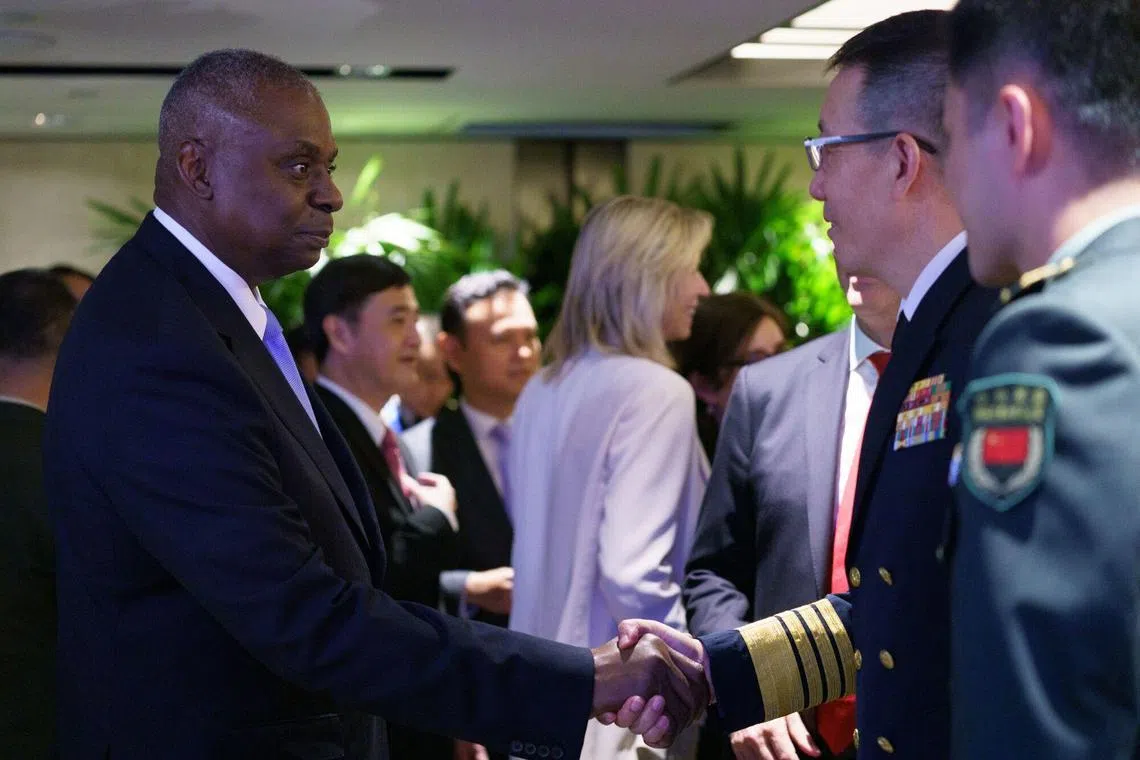Commentary
A tale of dialogues at the Shangri-La: Getting the Chinese message across in various ways
Sign up now: Get ST's newsletters delivered to your inbox

US Defence Secretary Lloyd Austin with his Chinese counterpart Dong Jun at a roundtable discussion at the Shangri-La Dialogue in Singapore on June 1.
PHOTO: BLOOMBERG
Follow topic:
Three hours after US Defence Secretary Lloyd Austin spoke on June 1 to a ballroom full of officials and scholars about deepening US partnerships in the Asia-Pacific, a senior Chinese general invited a group of about 50 selected journalists to a hotel room upstairs to counter Mr Austin’s speech and “set the record straight”.
Reading in Mandarin from a prepared script, Lieutenant-General Jing Jianfeng, deputy chief of the Joint Staff Department of the Central Military Commission, called the Indo-Pacific strategy espoused by Mr Austin
The two-star general in a blue air force uniform, whose job entails planning for actual combat operations, sprinkled his speech with war metaphors.
He warned that if regional countries were to sign up for the US’ Indo-Pacific strategy, they would be bound to the “US war chariot” and be lured into “taking bullets for the US”.
Lieutenant-General He Lei, a military scholar, also did not shy away from strident war talk when discussing Taiwan, a potential flashpoint for the US and China.
In the same hotel room, Lt-Gen He told reporters on May 31 that the recent Chinese military exercises near Taiwan
“That was a rehearsal for one of our battle plans.”
While other countries’ delegations habitually put out their messages through media interviews outside of scheduled speeches and panel sessions, China has in recent years significantly stepped up its efforts via a well-coordinated system of media briefings, interviews and organised questions by its delegates at the public sessions.
For instance, Chinese delegates would raise a question in English on the open floor of the forum to speakers such as Mr Austin and Philippine President Ferdinand Marcos Jr, to challenge their views.
Then they would brief reporters on their positions to counter the speakers more robustly and in their native language. No other delegation has briefed as many reporters as frequently as the Chinese.
Why such parallel tracks in putting out their messages at the Shangri-La Dialogue?
While China had participated in the forum since 2007, it was only in 2011 that it took the commendable step of sending its defence minister, in the spirit of engagement.
This is despite the fact that the forum, curated by the London-based International Institute for Strategic Studies and using English as the default language, gives more airtime to views that differ from China’s – inevitably creating a more uncomfortable environment for Chinese officials.
Like other speakers, the Chinese defence chief would also be subject to a live question and answer session without questions submitted in advance, unlike back home.
It is thus little wonder that the Chinese feel it is helpful to also have a separate dialogue of sorts on “home ground” at the Shangri-La hotel, in the rooms they booked and in the language of their choice.
Whether the efforts work is up for debate.
Some of the strong language at these briefings, though commonly used by Chinese government spokespersons when addressing their domestic audience, can seem jarring when expressed at an international platform for military diplomacy such as the Shangri-La Dialogue, where speakers largely refrain from naming, shaming and outright dissing the country they say they want to engage.
After Mr Austin met his Chinese counterpart Dong Jun
Explaining the seeming dissonance, one Chinese delegate argued that it boils down partly to the way the Chinese language is used.
When Mandarin speakers want to emphasise a point, they often use idioms, repeated phrases or dramatised expressions – which are not meant to be taken literally.
“We can be feeling very calm inside when we are using words that come across as agitated to others,” he said.
“Despite the harsh words, we weren’t being insincere when we say we want to engage.”
Another Chinese familiar with how diplomatic statements were crafted told me that it could be due to the clearing process for public statements.
Official positions, such as the one Lt-Gen Jing delivered in his statement on June 1, may need to be cleared in advance by the Central Military Commission, China’s top defence decision-making body led by President Xi Jinping that sits in Beijing.
This meant that the Chinese delegates conveying the positions at an international forum may not have much flexibility to adjust the message according to the mood or views expressed by other delegates.
The hope is that with more confidence and experience, they will appreciate that simply restating their positions – at a higher decibel – may not necessarily be the most effective.

